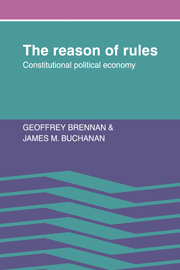Book contents
- Frontmatter
- Contents
- Preface
- 1 The constitutional imperative
- 2 The contractarian vision
- 3 The myth of benevolence
- 4 Modeling the individual for constitutional analysis
- 5 Time temptation, and the constrained future
- 6 Politics without rules, I: Time and nonconstrained collective action
- 7 Rules and justice
- 8 Politics without rules, II: Distributive justice and distributive politics
- 9 Is constitutional revolution possible in democracy?
- Index
1 - The constitutional imperative
Published online by Cambridge University Press: 05 November 2011
- Frontmatter
- Contents
- Preface
- 1 The constitutional imperative
- 2 The contractarian vision
- 3 The myth of benevolence
- 4 Modeling the individual for constitutional analysis
- 5 Time temptation, and the constrained future
- 6 Politics without rules, I: Time and nonconstrained collective action
- 7 Rules and justice
- 8 Politics without rules, II: Distributive justice and distributive politics
- 9 Is constitutional revolution possible in democracy?
- Index
Summary
Introduction
There is something profoundly unsatisfactory about economists' introducing their subject matter by reference to the Robinson Crusoe who faces an “economic problem” because he must decide how to allocate his scarce resources (including time) among competing uses. With this introduction, it becomes far too easy to slip from the Crusoe setting into one in which “society” as such also faces the “economic problem” and to jump, almost inadvertently, from analyses of individual utility maximization to direct concern with maximization of value for society.
What is left out in such a pedogogical sequence is the interaction among separate individuals who make up a society. Individuals face choices in a social setting in which the existence and behavior of other persons, along with the institutions that constrain their behavior, are much more important than the physical constraints of nature. Economics is, or should be, about individual behavior in society.
Such behavior is not necessarily “social” in the sense that individuals recognize the existence of reciprocal influence among the actions of directly interacting parties. Individual behavior in large modern societies may be totally impersonal, as exemplified in the idealized models of competitive markets. In the limiting case, all participants respond to exogenously determined parameters: No person exercises any direct influence on another. The outcomes of the complex interdependence of all actors are not available as objects of choice for any actor.
- Type
- Chapter
- Information
- The Reason of RulesConstitutional Political Economy, pp. 1 - 18Publisher: Cambridge University PressPrint publication year: 1986



